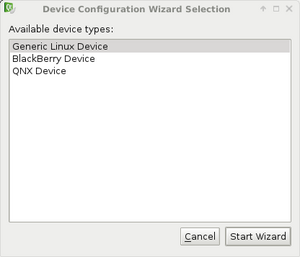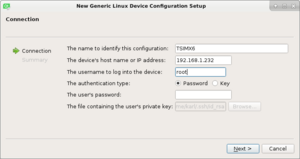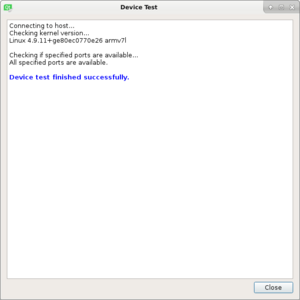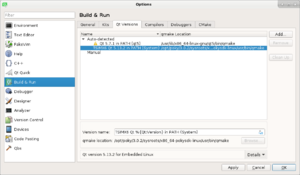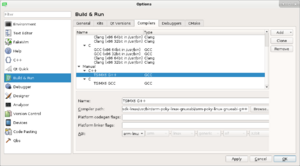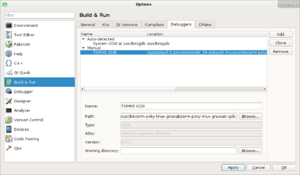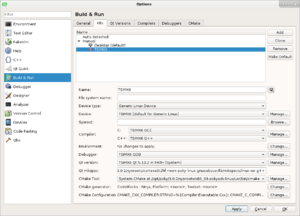TS-4900 QT5 IDE Setup: Difference between revisions
(Remove you and board) |
(Update to Yocto Zeus) |
||
| Line 1: | Line 1: | ||
{{Note|This guide is intended for our stock Yocto image using systemd. On custom images the | {{Note|This guide is intended for our stock Yocto image using systemd. On custom images, the same instructions should apply if a cross toolchain is built. This can be built through Yocto with <source lang=bash inline>bitbake meta-toolchain-qt5</source>. Be sure to update the paths if using a different distribution.}} | ||
| Line 7: | Line 7: | ||
</source> | </source> | ||
The SDK which includes the Qt support will also need to be downloaded | The SDK which includes the Qt support will also need to be downloaded. The cross toolchain is only available for 64-bit Linux host PCs: | ||
* [ | * [http://ftp.embeddedarm.com/ftp/ts-arm-sbc/ts-7990-linux/distributions/yocto/zeus/toolchain/poky-glibc-x86_64-meta-toolchain-qt5-cortexa9t2hf-neon-tsimx6-toolchain-3.0.2.sh poky-glibc-x86_64-meta-toolchain-qt5-cortexa9t2hf-neon-tsimx6-toolchain-3.0.2.sh] | ||
In order to install the toolchain, use the following commands to run the installation script: | |||
<source lang=bash> | <source lang=bash> | ||
sudo | chmod a+x poky-*.sh | ||
sudo ./poky-*.sh | |||
</source> | </source> | ||
These instructions assume the path will be default at | These instructions assume the installation path will be the default at <source lang=bash inline>/opt/poky/3.0.2/</source> | ||
{{Note|An environment script has to be sourced before ''every'' execution of qtcreator. | {{Note|An environment script has to be sourced before ''every'' execution of qtcreator. Without this, builds will fail.}} | ||
<source lang=bash> | <source lang=bash> | ||
source /opt/poky/ | source /opt/poky/3.0.2/environment-setup-cortexa9t2hf-neon-poky-linux-gnueabi | ||
qtcreator | qtcreator | ||
</source> | </source> | ||
Qt Creator needs to be configured to build using this toolchain. Once Qt Creator is launched, select Tools->Options->Devices | Qt Creator needs to be configured to build using this toolchain. Once Qt Creator is launched, select <source lang=bash inline>Tools->Options->Devices</source> Click <source lang=bash inline>Add</source>, select <source lang=bash inline>Generic Linux Device</source>, and then click <source lang=bash inline>Start Wizard</source> | ||
{| | {| | ||
| [[File:qtdeviceconfiguration.png|300px|right|Qt Device Configuration]] | | [[File:qtdeviceconfiguration.png|300px|right|Qt Device Configuration]] | ||
|} | |} | ||
On the next page specify the IP address or hostname of the device running Yocto. In this example, the unit has an IP address of 192.168.2.45 obtained | On the next page specify the IP address or hostname of the device running Yocto. In this example, the unit has an IP address of <source lang=bash inline>192.168.2.45</source> obtained via DHCP. The default Yocto image will use the user <source lang=bash inline>root</source> with no password to connect. Set the name to <source lang=bash inline>TSIMX6</source> | ||
{| | {| | ||
| Line 40: | Line 40: | ||
|} | |} | ||
{{Note| | {{Note|The paths given in the images below may not match the latest toolchain, but are meant to show where these values would go. Follow the text appropriate to the architecture of your host PC for the correct values}} | ||
In the left column of the <source lang=bash inline>Options</source> menu, select <source lang=bash inline>Build & Run</source>. On the <source lang=bash inline>Qt Versions</source> tab, click <source lang=bash inline>Add</source> in the upper right to configure the TS Kit. Qt Creator may see the <source lang=bash inline>qmake</source> binary added to your path from the sourced environment script. If this is detected, add in the string <source lang=bash inline>TSIMX6</source> to the title as shown in the photo below. If it is not autodetected, add the full path and ensure the version name is set to <source lang=bash inline>TSIMX6 Qt 5.13.2</source>. This will allow it to be recognized when setting the right binary for the kit. | |||
<source lang=bash>/opt/poky/3.0.2/sysroots/x86_64-pokysdk-linux/usr/bin/qmake</source> | |||
{| | {| | ||
| Line 60: | Line 52: | ||
On the | On the <source lang=bash inline>Compilers</source> tab click <source lang=bash inline>Add</source>, select <source lang=bash inline>GCC</source> then <source inline>C</source>. Set the Name to <source lang=bash inline>TSIMX6 GCC</source>. For the <source lang=bash inline>Compiler Path</source> use the following: | ||
<source lang=bash>/opt/poky/3.0.2/sysroots/x86_64-pokysdk-linux/usr/bin/arm-poky-linux-gnueabi/arm-poky-linux-gnueabi-gcc</source> | |||
Repeat the above steps for the g++ compiler; click <source inline>Add</source>, select <source inline>GCC</source> then <source inline>C++</source>. Set the name to <source inline>TSIMX6 G++</source>. And for the <source inline>Compiler Path</source> use the following: | |||
<source lang=bash>/opt/poky/3.0.2/sysroots/x86_64-pokysdk-linux/usr/bin/arm-poky-linux-gnueabi/arm-poky-linux-gnueabi-g++</source> | |||
{| | {| | ||
| Line 73: | Line 62: | ||
|} | |} | ||
On the | On the <source lang=bash inline>Debuggers</source> tab click <source lang=bash inline>Add</source>. For name, specify <source lang=bash inline>TSIMX6 GDB</source>. For the path, specify the location of gdb with the following: | ||
<source lang=bash>/opt/poky/3.0.2/sysroots/x86_64-pokysdk-linux/usr/bin/arm-poky-linux-gnueabi/arm-poky-linux-gnueabi-gdb</source> | |||
{| | {| | ||
| Line 86: | Line 70: | ||
|} | |} | ||
On the | On the <source lang=bash inline>Kits</source> tab click <source lang=bash inline>Add</source>. For <source lang=bash inline>Name</source>, enter <source lang=bash inline>TSIMX6</source>. Set device type to <source lang=bash inline>Generic Linux Device</source>. Set the device to <source inline>TSIMX6 (default for Generic Linux)</source>. Set <source lang=bash inline>Qt mkspec</source> to the following (make sure there is no space at the end): | ||
<source lang=bash>/opt/poky/ | |||
<source lang=bash>/opt/poky/3.0.2/sysroots/cortexa9t2hf-neon-poky-linux-gnueabi/usr/lib/mkspecs/linux-oe-g++</source> | |||
Set | Set <source inline>C Compiler</source> to <source inline>TSIMX6 GCC</source> and <source inline>C++ Compiler</source> to <source inline>TSIMX6 G++</source>. Set <source inline>Debugger</source> to <source inline>TSIMX6 GDB</source>. Set the <source inline>Qt version</source> to <source inline>TSIMX6 QT 5.13.2</source>. Finally, click Apply. | ||
{| | {| | ||
| [[File:qtkit.png|300px|right|Qt Kit tab]] | | [[File:qtkit.png|300px|right|Qt Kit tab]] | ||
Revision as of 17:36, 24 March 2020
| Note: | This guide is intended for our stock Yocto image using systemd. On custom images, the same instructions should apply if a cross toolchain is built. This can be built through Yocto with bitbake meta-toolchain-qt5. Be sure to update the paths if using a different distribution.
|
Install the qtcreator tool on a host Linux PC. Any recent version from a modern Linux distribution should be sufficient and work without issue. On a Debian/Ubuntu desktop, run:
sudo apt-get update && sudo apt-get install qtcreator -y
The SDK which includes the Qt support will also need to be downloaded. The cross toolchain is only available for 64-bit Linux host PCs:
In order to install the toolchain, use the following commands to run the installation script:
chmod a+x poky-*.sh
sudo ./poky-*.sh
These instructions assume the installation path will be the default at /opt/poky/3.0.2/
| Note: | An environment script has to be sourced before every execution of qtcreator. Without this, builds will fail. |
source /opt/poky/3.0.2/environment-setup-cortexa9t2hf-neon-poky-linux-gnueabi
qtcreator
Qt Creator needs to be configured to build using this toolchain. Once Qt Creator is launched, select Tools->Options->Devices Click Add, select Generic Linux Device, and then click Start Wizard
On the next page specify the IP address or hostname of the device running Yocto. In this example, the unit has an IP address of 192.168.2.45 obtained via DHCP. The default Yocto image will use the user root with no password to connect. Set the name to TSIMX6
It will then verify connectivity. Click close and continue.
| Note: | The paths given in the images below may not match the latest toolchain, but are meant to show where these values would go. Follow the text appropriate to the architecture of your host PC for the correct values |
In the left column of the Options menu, select Build & Run. On the Qt Versions tab, click Add in the upper right to configure the TS Kit. Qt Creator may see the qmake binary added to your path from the sourced environment script. If this is detected, add in the string TSIMX6 to the title as shown in the photo below. If it is not autodetected, add the full path and ensure the version name is set to TSIMX6 Qt 5.13.2. This will allow it to be recognized when setting the right binary for the kit.
/opt/poky/3.0.2/sysroots/x86_64-pokysdk-linux/usr/bin/qmake
On the Compilers tab click Add, select GCC then C. Set the Name to TSIMX6 GCC. For the Compiler Path use the following:
/opt/poky/3.0.2/sysroots/x86_64-pokysdk-linux/usr/bin/arm-poky-linux-gnueabi/arm-poky-linux-gnueabi-gcc
Repeat the above steps for the g++ compiler; click Add, select GCC then C++. Set the name to TSIMX6 G++. And for the Compiler Path use the following:
/opt/poky/3.0.2/sysroots/x86_64-pokysdk-linux/usr/bin/arm-poky-linux-gnueabi/arm-poky-linux-gnueabi-g++
On the Debuggers tab click Add. For name, specify TSIMX6 GDB. For the path, specify the location of gdb with the following:
/opt/poky/3.0.2/sysroots/x86_64-pokysdk-linux/usr/bin/arm-poky-linux-gnueabi/arm-poky-linux-gnueabi-gdb
On the Kits tab click Add. For Name, enter TSIMX6. Set device type to Generic Linux Device. Set the device to TSIMX6 (default for Generic Linux). Set Qt mkspec to the following (make sure there is no space at the end):
/opt/poky/3.0.2/sysroots/cortexa9t2hf-neon-poky-linux-gnueabi/usr/lib/mkspecs/linux-oe-g++
Set C Compiler to TSIMX6 GCC and C++ Compiler to TSIMX6 G++. Set Debugger to TSIMX6 GDB. Set the Qt version to TSIMX6 QT 5.13.2. Finally, click Apply.
| Note: | If there is a red exclamation point over the kits icon, it indicates that the compiler ABI does not match. In this case, you will need to revisit the "Compiler", "Debugger", and "Qt Versions" tabs, and browse the host PC for these files manually rather than copy/pasting the paths from these instructions. This is a bug in Ubuntu 16.04's Qt Creator, and may be in later versions as well. |
At this point Qt Creator is set up to begin a hello world project.
